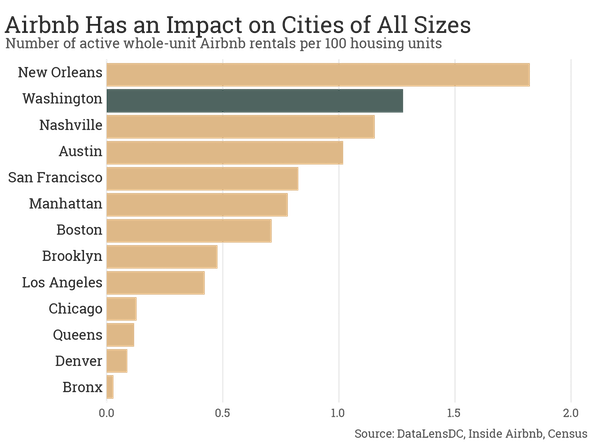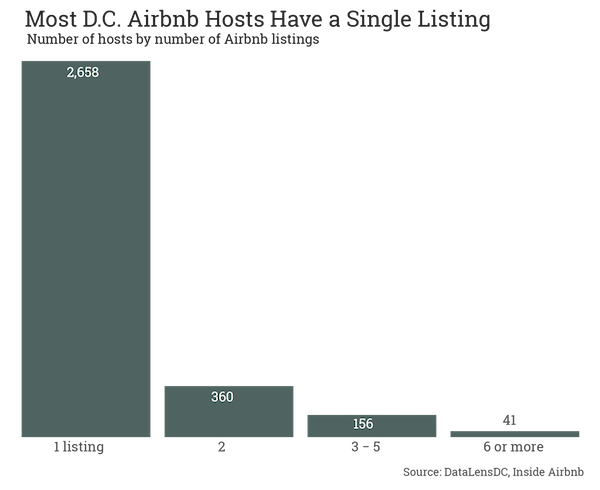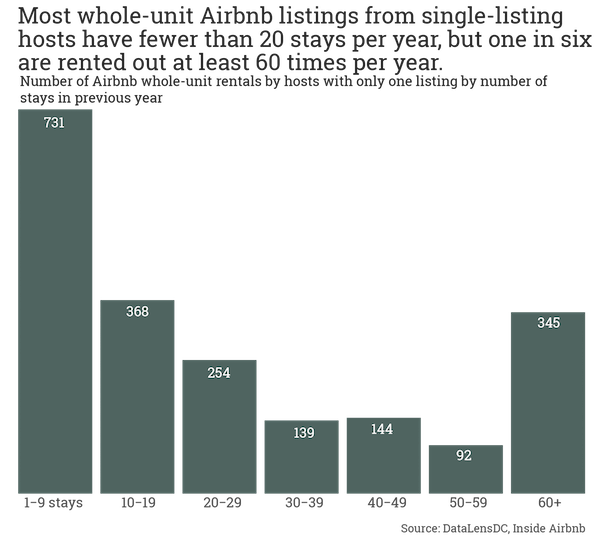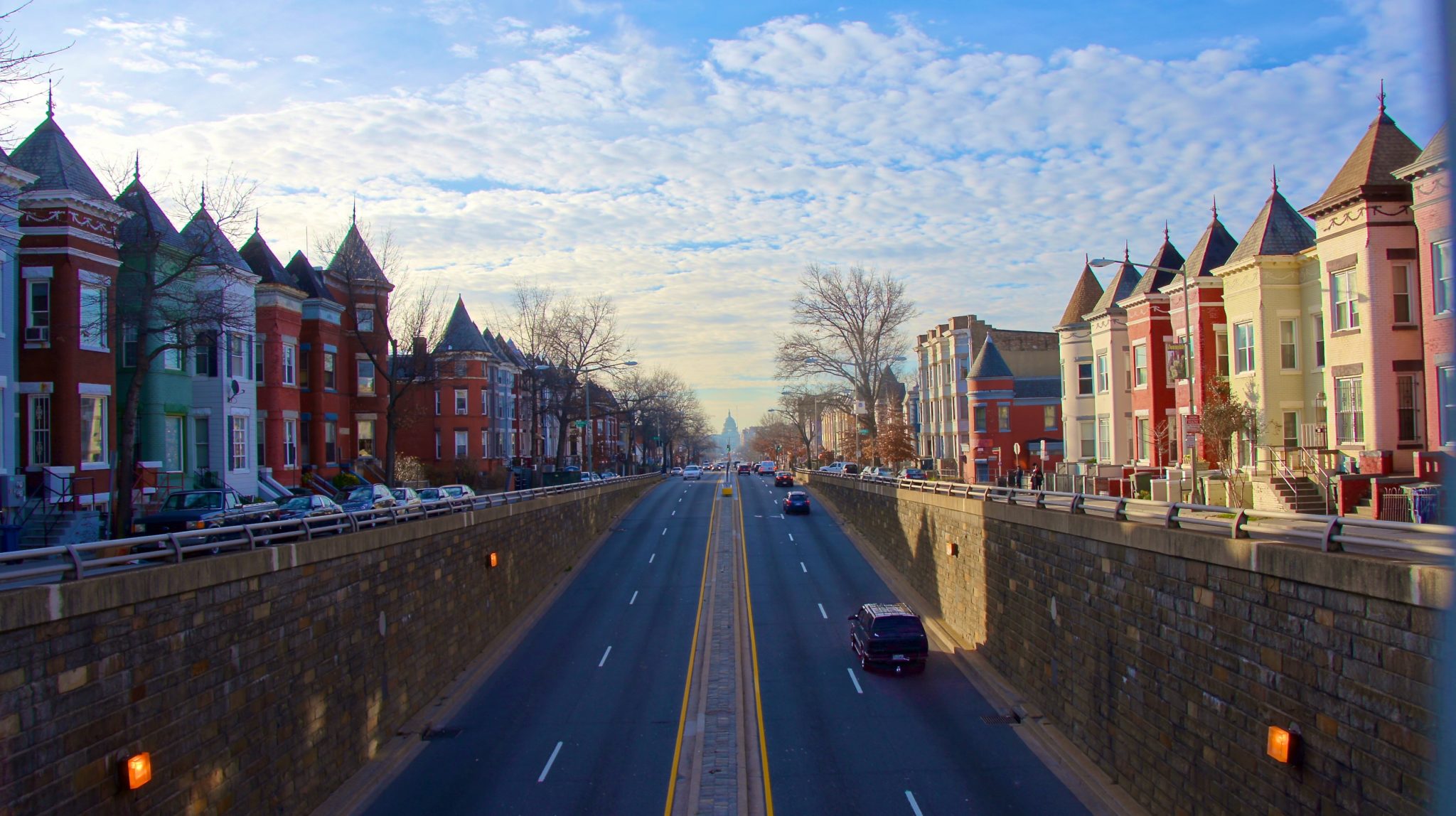Last month, researchers from McGill University released a report on the outsized role of commercial Airbnb operators, and the impact of Airbnb rentals on New York City’s housing supply.[1] Commercial operators are hosts who list multiple whole-units or at least three private rooms—in other words, hosts who are not simply renting out a spare bedroom or their home while out of town.
The McGill researchers found that a majority (51 percent) of listings in New York City were for an entire home or apartment, and that these whole-unit listings—the vast majority of which appear to be illegal under New York State law—account for 75 percent of total Airbnb revenue in the city. They also estimated that commercial operators account for 12 percent of hosts in New York City, but more than a quarter of Airbnb’s revenue there. The report concluded that Airbnb rentals had removed between 7,000 and 13,500 units from the city’s long-term rental market and increased median New York rent by $380 over the past three years.
Short-term rentals are a concern beyond New York: Cities of all sizes are feeling the effect of Airbnb (as well as smaller competitors such as HomeAway) on their housing supply. Data released by Inside Airbnb, an independent website that collects data on Airbnb listings, shows that in at least four cities, active whole-unit rentals on Airbnb made up more than one percent of all housing units.[2] And among cities with available data, Washington, D.C. ranked second in active Airbnb house or apartment rentals per housing unit.

How many Airbnb rentals are there in D.C.?
D.C. government and residents can’t know for certain how many short-term rentals exist. The Department of Consumer and Regulatory Affairs (DCRA) does require a business license for hosts of short-term rentals, but there is no active enforcement and the agency says the number of short-term rentals exceeds what is licensed.
Without complete government records, D.C. must rely on Airbnb and other platforms for short-term rental data. Most data Airbnb releases is through Airbnb Citizen, the company’s official advocacy channel that is supported by Airbnb’s public policy team.
There is no external requirement or apparent company policy for the frequency or type of data Airbnb releases through this channel, which makes it extremely difficult to track Airbnb’s impact over time or in different places. For instance, Airbnb Citizen recently released a 2017 summary for D.C., published under the site’s “News” section; D.C. is one of the few cities Airbnb Citizen released this type of data for, and the scope of the data it released for each city was not the same. Elsewhere on the site, a “Data Dashboard” shows data for D.C. and other cities from 2015. This scattered approach suggests that future data releases are uncertain.
We can assume that the data Airbnb Citizen releases is likely to be data that benefits Airbnb’s image. For instance, Airbnb’s reported proportion of hosts renting out their permanent home includes hosts that also list other properties, as opposed to hosts who only rent out their own home. Data tends to focus on number of guests—guest arrivals, average annual number of guests per listing, average length of stay per guest—which helps to frame the story around economic impact of people visiting. Researchers who study Airbnb and its impact on housing prefer data on the total number of trips or stays, which Airbnb is less likely to publish but better captures housing potentially removed from the market. Similarly, Airbnb releases data that speaks to the gender diversity of hosts, but not race/ethnicity.
The data Airbnb publishes is also too high-level to draw meaningful conclusions. Reports focus on totals, medians, and averages, when detailed data is needed for governments and policy analysis. Similarly, housing cost and availability is not uniform across a city, so knowing the geography of individual listings is important as well.
The only way to obtain data about Airbnb detailed enough for policy research is to scrape Airbnb’s website for listings. Consulting firm Airdna has made a business of scrapping and charging for its data and analysis. The website Inside Airbnb, founded by community activist Murray Cox, scrapes and freely publishes Airbnb listings periodically for cities around the world. The data represents a point-in-time view of all listings, their characteristics, reviews, and availability.
Based on this data, here are some of the main takeaways about Airbnb activity in D.C.:
As of May 2017, according to Inside Airbnb data, there were 7,788 D.C. listings. Roughly 2,600 listings did not have a review in the past year (which suggests that no one rented those units), and an additional 630 reported no availability in the coming year (which suggests they are no longer active). Therefore, out of 7,788 total listings on Airbnb in D.C., we can assume that only 4,553 were active. Active listings grew by 68 percent in the prior year and half.
Based on these active listings, it appears that there are 3,256 active hosts. Further analysis reveals that the website’s host population experiences a high rate of churn: Of the 3,256 active hosts in May 2017, only 27 percent were also active hosts in October 2015. Over 40 percent of the active hosts in October 2015 were no longer hosts a year and a half later.
Airbnb listings are most common in higher-rent neighborhoods that are closer to the city center. For instance, Capitol Hill and Columbia Heights have over 400 listings each, while some neighborhoods east of the Anacostia have under five.
Over two-thirds of Airbnb listings in D.C. are for entire houses or apartments. Like the overall number of listings, whole-unit rentals make up a higher proportion of listings in high-rent neighborhoods: In Chinatown through the West End, whole-unit rentals make up nearly 90 percent of listings. Neighborhoods like Lincoln Heights and Fort Stanton have no listings for whole-units at all.
Airbnbs Concentrated in High-Rent, High-Demand Neighborhoods
Number of Active Airbnb Listings
Estimating the reach of commercial Airbnb operators
The vast majority of Airbnb hosts—nearly 83 percent—that list whole units or private rooms only have one active listing. On the other end of the spectrum, 41 Airbnb hosts have six or more active listings.

Note: Includes only private room and whole-unit listings. Excludes shared rooms.
It is difficult to pin down the exact number of commercial Airbnb operators. However, we can estimate using the methods put forth by McGill researchers that defines a commercial operator as a host with at least one whole unit listing or three private room listings. This is likely an underestimation, as a host may use multiple accounts. But even this conservative estimate suggests the following findings:
Commercial operators make up 11 percent of hosts in D.C., but their properties make up 30 percent of listings. They take up a third of bookings and, on average, are more expensive and have higher minimum night requirements than non-commercial hosts. The proportion of commercial operators has increased from 8 percent a year and a half prior.
Most commercial operators on Airbnb have small portfolios; just over half have two active listings. However, some operators have a much wider reach—five operators listed over 20 active properties each in the District. Include non-active listings that have yet to receive a review, and the number grows even larger: One operator has 66 listings in total. The numerous unreviewed listings by commercial operators suggest these are newer listings and commercial operators are expanding.
Some commercial operators are more explicit about their business on their profiles than others. The largest active portfolio belongs to “Lara and Alex,” with 36 active listings, who “manage vacation rentals on behalf of their owners” in D.C. and London. While host “Kara” had only 18 active listings at the time, she had an additional 48 in D.C. yet to be reviewed. Her host profile contains no biography or list of properties, and her profile picture is of a living room. Based on reviews, Kara operates in D.C., Boston, St. Louis, Manhattan, and Silicon Valley. Conversely, commercial operator Seamless identifies itself as a “full-service relocation management agency that also offers quality short-term housing solutions” in major American cities.
The largest commercial hosts operate exclusively west of the Anacostia River, with the greatest presence downtown, in Chinatown through Foggy Bottom. While most parts of D.C. have Airbnb listings by commercial operators, commercial listings are disproportionately present in Georgetown, Dupont, Chinatown, downtown, and the West End, placing further pressure on high-rent neighborhoods with few affordable options. These listings are considered particularly problematic because they likely take housing units off the market that would have otherwise been available to residents.
How often do hosts with whole-unit listings rent out their homes?
Even when a host only lists one whole-unit listing on Airbnb, that listing may not be their primary residence. Therefore, looking at the number of properties listed alone will likely undercount the number of commercial operators in D.C.; we can additionally look at bookings for individual whole-unit listings in a year and how many nights they were rented out. For instance, nearly 40 listings require stays of at least 10 nights. These are less likely to be primary residences; some listings indicate the host lives elsewhere in D.C., or that the minimum stay is so long because of condo rental requirements.
In their 2017 year-end summary, Airbnb reported that the “typical host”[3] rented a listing for 49 nights. However, this single data point doesn’t tell us much about the distribution of stays—how many hosts rent out a listing only occasionally, and how many rent out their properties dozens of times a year. While we lack access to Airbnb’s internal data, researchers frequently estimate the number of times listings were rented out based on the number of reviews.[4] Using this method, we find that a third of Airbnb hosts with single whole-unit listings host fewer than ten times a year. A majority have under 30 stays a year. On the tail end, however, 17 percent have 60 or more stays.

This approach can give us insight into the number of times a unit was rented, but not the total number of days it was rented. However, Airbnb has reported that in D.C., the average stay lasts 4.4 nights per guest was used (the number of guests is unknown). For a conservative estimate assuming one guest per listing and a 4.4-day stay per guest, this suggests that more than 600 active whole-unit listings are frequently rented, and less likely to be primary residences. Half of those are very frequently rented, and less likely to be primary residences, and over 300 are very frequently rented, and highly unlikely to primary residences.[5] McGill researchers defined very frequently rented as units that have been rented at least 120 days and available at least 240 days.
Considerations for policymakers
The typical Airbnb host is likely to be a non-commercial host renting out their primary residence. Yet though commercial operators are not a large proportion of Airbnb hosts, they can have an outsized impact on the city’s housing supply due to the numbers of properties they manage. Additionally, commercial listings have more bookings and, on average, longer minimum stay requirements. Their concentration in high-rent, low-vacancy neighborhoods exacerbates D.C.’s existing affordable housing crisis.
Currently, people who provide short-term rentals are supposed to obtain a basic business license from D.C.’s Department of Regulatory Affairs (DCRA). Depending on zoning, a Board of Zoning Adjustment Approval may be required, along with a Home Occupation Permit for lodging. The length of short-term rental bookings is not supposed to exceed 29 days[6]. Condos also tend to have bylaws prohibiting short-term rentals.
In practice, there is virtually no enforcement of these requirements, and DCRA has acknowledged[7] the number of permits are less than would be expected. In at least one particularly egregious case, where a management company operated at least 46 short-term rentals in two rent-controlled apartment buildings, Attorney General Karl Racine successfully sued one commercial operator last year under the Rental Housing Act of 1985, which makes it illegal to convert rental housing into tourist rentals.
Since the launch of Airbnb in 2008, D.C. has not passed any legislation to modernize its short-term rental laws. (The city does collect 14.5 percent in taxes off Airbnb rentals, directly through the website itself.) Last year Councilmember McDuffie introduced legislation that seeks to better formalize the regulation of short-term rentals in the District and restrict commercial operations. The key components of the legislation hit upon the main issues for any discussion of regulating the short-term rental market:
- Licensing and Data. McDuffie’s bill creates a new licensing category for short-term rentals and requires DCRA to collect statistics on short-term rental activity. While business licenses are technically required now, the lack of enforcement means the number of licenses captures an incomplete picture. D.C. does not know the number of short-term rentals that exist, but it should—both in order to track their business activity and to understand their impact on housing. Quality data collection is necessary for any new regulation, but the data Airbnb provides is incomplete and unsuitable for decision-making.
- Realistic Enforcement. McDuffie’s bill requires active regulatory and code enforcement from DCRA, but without additional funding this seems highly unlikely. It’s unclear how effective enforcement would be under DCRA, which currently relies on passive enforcement, such as a 311 complaint, for such enforcement. DCRA is also coming off a year of enhanced oversight from the Council, with many members thinking it should be split up due to mismanagement and ineffectiveness. McDuffie’s bill also requires short-term rental companies like Airbnb to verify and display business licenses for each listing. Requiring companies to monitor or automate compliance was previously successful for tax collection.
- Deciding how to address multiple listings. The majority of multi-listers have two or three listings each, and are different from large-scale operators with 30 or more properties. However, both are still commercial operators offering short-term rentals in areas often zoned entirely residential, in a city with an affordable housing crisis. If a city’s goal is to prevent buildings from being used for short-term rentals instead of for residential housing, a hard limit on one listing per host (along with licensing and active enforcement) would appear to be most effective. McDuffie’s bill limits hosts to one property each and requires proof of residency (English basement apartments are considered part of a single property for residency purposes).
- Number of nights a listing can be booked per year. An upper limit on booked nights is another potential avenue to addressing potential commercial operators. McDuffie’s bill sets an annual limit on short-term rentals of 15 nights per year. The vast majority of whole-unit listings in D.C. are rented out for more than 15 days a year, but this doesn’t necessarily mean they’re run by commercial operators. There are 104 weekend days per year, and D.C. is full of jobs that can require a lot of travel. Airbnb believes the upper limit should be 180 days, but it seems unlikely someone can rent out their primary residence for half of the year. A middle ground would more likely accomplish the city’s goals. For instance, San Francisco and London each limit entire-unit rentals to 90 days per year.
McDuffie’s bill is not the first time legislation to further regulate and restrict short-term rentals has come in front of D.C. Council, and it remains to be seen if the current bill on short-term renting will make it out of committee. The last action was a public hearing in April. Recently activist group Airbnb Watch held an event to bring focus back to the bill. According to McDuffie’s office, they’ve been hearing there will be movement on the bill in the next two months for the past six to eight months.
About the data
Data is from Inside Airbnb, and was scraped from Airbnb’s website on May 10, 2017.
All analysis in this article is based on active listings. Active listings are defined here as a listing with availability over the next year and at least one review in the past year. Reporting only the total number of listings on Airbnb can be misleading, as people may fail to delete their accounts after one-time listings. For instance, many people listed their homes on Airbnb for the presidential inauguration, but those units are otherwise unavailable.
For purposes of this analysis, “commercial operators” are defined as hosts who list at least one entire home or apartment or at least three private rooms.
Housing units data is from the Census Bureau’s 2016 County Total Housing Unit Estimates.
Notes
[1] The report was commissioned by the Hotel Trades Council, AFL-CIO (a hotel workers’ union) and cosponsored by a number of New York City community, housing, and tenant advocacy organizations, but written solely by researchers from the McGill University School of Urban Planning.
[2] Active listings are defined here as a listing with availability over the next year and, if there are reviews, at least one review in the past year. See “About the data” for more information.
[3] Airbnb defines the typical host as the median host for all hosts who had at least one active listing as of the start of the study period and at least one booking during the study period.
[4] Most models that predict Airbnb nights booked or revenue rely on extrapolating from the number of reviews, but there are a wide range of estimates on how many guests leave reviews. The CEO of Airbnb in 2012 said that 72 percent of guests left a review. The New York State Attorney General’s Office estimated in 2014 that 30.5 percent of stays resulted in a review. A 2017 research paper from Columbia University found the review rate to be right in the middle, at 55 percent, and this is the review rate that this analysis assumes.
[5] McGill researchers defined frequently-rented as units that have been rented at least 60 days and available at least 120 days, while very frequently-rented are units rented at least 120 days and available at least 240 days.
[6] https://dc.urbanturf.com/articles/blog/how_to_legally_list_on_airbnb_in_dc/12537
[7]https://www.washingtonpost.com/local/dc-news/airbnb-becomes-flash-point-in-the-districts-hot-debate-over-gentrification/2017/11/21/3c3bcdb2-bf19-11e7-8444-a0d4f04b89eb_story.html
Kate Rabinowitz is a freelance data journalist who has previously worked at ProPublica and created DataLensDC (datalensdc.com). Her work has been featured in numerous D.C. and city-focused publications. Kate is also the co-captain of civic hacking group Code for DC.
